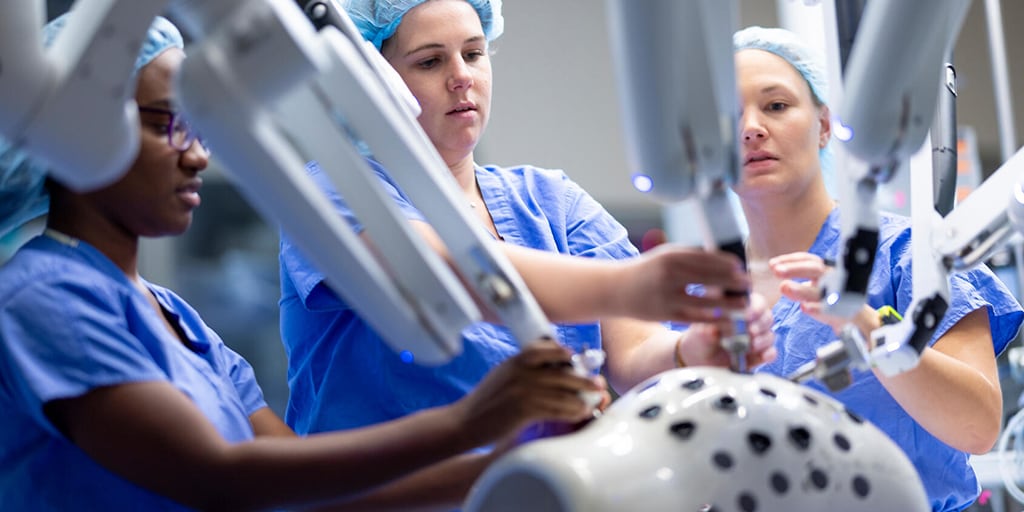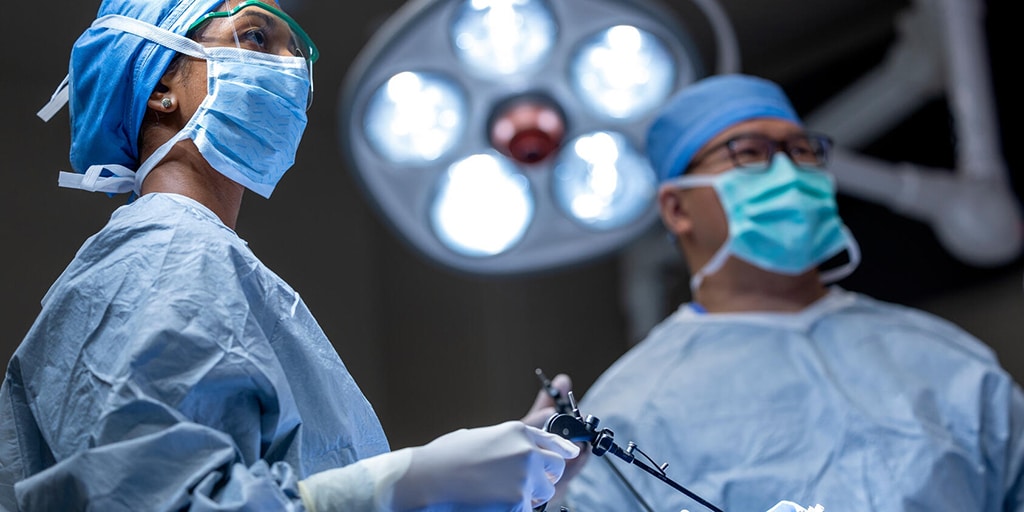Curriculum
/prod01/channel_2/media/mccms/content-assets/academics/residencies-and-fellowships/general-surgery-residency-arizona/curriculum/gen-surg-az-tube-1024X512-WF4453610_0057.jpg)
The General Surgery Residency at Mayo Clinic in Phoenix/Scottsdale, Arizona, is designed much like a series of postgraduate courses in various surgical disease entities with prominent clinical laboratory experience in patient care and operations.
Residents are assigned personal devices and have online access to the Surgical Council on Resident Education (SCORE) curriculum, which is the basis for the American Board of Surgery In-Training Examination (ABSITE) as well as the General Surgery Qualifying Examination (written boards). The weekly didactic conference schedule is based on SCORE and is partitioned into subject matter categories to facilitate learning (stomach, hernia, and breast, for example). There are basic science lectures led by PGY-1 residents and supervised by faculty followed by clinical lectures the next day on the same topic, led by the faculty member who supervised the basic science lecture. This method has worked very well and leads to an engaging didactic curriculum which our residents enjoy.
We have a robust simulation curriculum which is led by Dr. Patricia Cronin, associate program director, on Friday mornings. In addition, we have didactic sessions on "non-technical surgical skills" throughout the year.
In July, we have a month-long bootcamp for the interns. In January, we have ABSITE-specific sessions for the entire month.
Clinical training
Our program is a hybrid of two training models which prepare residents in unique ways. The mentoring and mastery model which lets you learn first-hand (one-on-one) from expert surgeons and chief residents. The traditional team-based model which lets you learn how to function in a team and as a leader while learning more complex cases from subspeciality surgeons.
Within the mentoring and mastery models of minimally invasive and chief services at Mayo Clinic in Arizona, you are the only resident, even as a PGY-1 or 2. Trainees operate with the faculty surgeons whenever they are operating and see outpatients whenever they are in clinic.
This model provides educational continuity from preoperative evaluation and operative techniques to postoperative techniques and postoperative care from day one of training. Mayo Clinic's campus in Arizona also provides extensive training in minimally invasive techniques for all services and through our minimally invasive surgery service.
 As a resident, your first two years focus on common diseases and simple to moderately complex operations such as:
As a resident, your first two years focus on common diseases and simple to moderately complex operations such as:
- Lumpectomy and sentinel lymph node biopsy
- Open inguinal hernia repair
- Mastectomy
- Laparoscopic cholecystectomy
- Laparoscopic ventral hernia repair
 In the third and fourth years, you will treat a broad scope of surgical disease and perform more complex operative procedures, such as:
In the third and fourth years, you will treat a broad scope of surgical disease and perform more complex operative procedures, such as:
- Gastrectomy
- Aortic aneurysm repair
- Hepatic and pancreatic resections
- Laparoscopic colectomy
- Pneumonectomy
Work rounds are held on all services at least twice a day; teaching rounds are conducted with supervising faculty members daily.
A unique aspect of Mayo Clinic's program is the institution's physician schedule, which alternates each day between operative and nonoperative responsibilities. This scheduling permits surgical services to function as a team in the hospital and in the outpatient clinic. It also facilitates participation in the total care of patients under the supervision of a faculty member.
As a resident, your responsibilities will vary according to the specific rotation and your level of training. Supervising faculty members will delegate and supervise all aspects of patient care, including diagnosis, preoperative, intraoperative, and postoperative care with subsequent outpatient follow-up. Additionally, senior residents supervise junior residents on a day-to-day basis.
Rotation schedule
PGY-1
| Rotation | Length (1 block = 4 weeks) |
|---|---|
| Acute care surgery | 5 blocks |
| Surgical oncology | 2 blocks |
| Vascular surgery | 1 block |
| Colon and rectal surgery | 1 block |
| Trauma and critical care surgery | 2 blocks |
| Burn surgery | 1 block |
| Minimally invasive and bariatric surgery | 1 block |
Required off-site rotations
All General Surgery Residency training takes place at Mayo Clinic's campus in Scottsdale and Mayo Clinic Hospital in Phoenix, Arizona, except for the following rotations:
- Burn surgery. One month at the Arizona Burn Center at Valleywise Health Medical Center in Phoenix, Arizona, which is an American Burn Association and American College of Surgeons nationally verified burn center.
- Trauma and critical care surgery. Two months at St. Joseph's Hospital and Medical Center in Phoenix, Arizona, the only Level 1 Trauma Center in Phoenix designated by the state of Arizona and verified by the American College of Surgeons.
PGY-2
| Rotation | Length (1 block = 4 weeks) |
|---|---|
| Surgical oncology | 2 blocks |
| Critical care | 2 blocks |
| Plastic/reconstructive surgery | 1 block |
| Endoscopy | 1 block |
| Minimally invasive and bariatric surgery | 5 blocks |
| Colon and rectal surgery | 1 block |
| Transplant surgery | 1 block |
PGY-3
| Rotation | Length (1 block = 4 weeks) |
|---|---|
| Surgical oncology | 3 blocks |
| Vascular surgery | 3 blocks |
| VA general surgery | 2 blocks |
| Cardiothoracic surgery | 2 blocks |
| Pediatric surgery | 2 blocks |
| Minimally invasive and bariatric surgery | 1 block |
Required off-site rotations
All General Surgery Residency training takes place at Mayo Clinic's campus in Scottsdale and Mayo Clinic Hospital, Phoenix, Arizona, except for the following rotations:
- Pediatric surgery. Three months at Phoenix Children's Hospital, the only dedicated children's hospital in the Phoenix metropolitan area. Residents also participate in pediatric surgical care at St. Joseph's Hospital and Medical Center when on this rotation.
- General surgery. Two months at St. Joseph's Hospital and Medical Center, which offers a private practice general surgery experience.
PGY-4
| Rotation | Length (1 block = 4 weeks) |
|---|---|
| Trauma and critical care surgery | 2 blocks |
| Hepatobiliary and transplant surgery | 2 blocks |
| Colon and rectal surgery | 3 blocks |
| Surgical oncology | 3 blocks |
| Minimally invasive and bariatric surgery | 2 blocks |
| Elective | 1 block |
Required off-site rotations
All General Surgery Residency training takes place at Mayo Clinic's campus in Scottsdale and Mayo Clinic Hospital in Phoenix, Arizona, except for the following rotations:
Trauma and critical care surgery. Two months at St. Joseph's Hospital and Medical Center in Phoenix, Arizona, the only Level 1 Trauma Center in Phoenix designated by the state of Arizona and verified by the American College of Surgeons.
PGY-5
| Rotation | Length (1 block = 4 weeks) |
|---|---|
| Acute care surgery | 13 blocks |
In the PGY-5 year, chief residents function like junior faculty under the supervision of senior faculty members. They are assigned their own surgical service with operating time, office and secretarial support, and a consulting calendar of scheduled patients. This experience is extraordinarily valuable in transitioning to an even higher level of autonomy prior to fellowship training or clinical practice.
Didactic training
Clinical conferences, seminars, small discussion groups, and one-on-one instruction are an integral part of Mayo Clinic's General Surgery Residency.
Conferences
All residents are required to attend conferences each weekday from 7 to 8 a.m.
- Monday: Surgical grand rounds
- Tuesday: Morbidity and mortality conference
- Wednesday: Interactive basic science conference
- Thursday: Clinical management-based conference
- Friday: Surgical simulation skills lab
Other conferences include:
- Program Director's conference
- Endocrine teleconference
- Journal club
- Chief conference
- Chief town hall (this is a resident-only meeting)
Surgical skills and minimally invasive surgery lab
The General Surgery Residency has a formal curriculum for surgical skills and minimally invasive skills training. A dedicated lab is provided along with direct faculty instruction. Simulators, laparoscopic training stations, a surgical robot trainer, animal and cadaveric labs are all provided. Access to the skills lab is 24/7 for individual practice in addition to the formal curriculum.
Research training
All surgical residents must complete five clinical research projects during their five-year residency, of which at least two need to be as first author. Trainees will define a question, write a protocol, develop the methodology, collect and analyze data, then write an abstract and paper under the mentorship of our faculty.
Residents present their work at regional and national meetings, and submit their research to peer-reviewed journals for publication. The residency finances resident travel within the continental United States for presenting research.
Additional research year
Between the second and third year of residency, two of the four categorical residents per class can dedicate an extra year of training to research. The research year, during which no clinical duties are assigned, is in addition to the five clinical years of training.
During the research year, the residency provides a continued stipend and benefits, and this time may be used for basic (bench) or clinical research. One research spot can be utilized to work with a mentor at other institutions outside of Mayo Clinic.
Recent residents have enjoyed opportunities for research at:
- University of Cambridge
- MD Anderson Cancer Center
- Memorial Sloan Kettering Cancer Center
- Arizona State University
- O'Brien Institute (Melbourne, Australia)
- Massachusetts General Hospital
Board examinations
Residents are required to take the written American Board of Surgery In-Training Examination (ABSITE) each year. Trainee status in the program is not determined solely by ABSITE results; however, a score greater than the 50th percentile is expected and a score of greater than 33rd percentile is required.
Oral in-service examinations
During the fourth and fifth years of training, residents participate in mock oral examinations given by surgeons from both inside and outside Mayo Clinic. These exams are in preparation for the certifying examination of the American Board of Surgery (ABS). Three 30-minute interviews are conducted in a format similar to that used by the ABS. Traditionally, these interviews have become a valuable experience for graduating residents.
Call frequency
PGY-1 residents have a night float system for call while on the acute care surgery service, which is one week in length. Trainees average two of every three weekends off. Upper level residents are on pager call from home every fourth or fifth night, and every fourth or fifth weekend. At the very least, one day in seven is free of all duty.
Committee assignments
As a resident, you have the opportunity to gain experience in administrative capacities. For example, those appointed to the General Surgery Residency education committee gain experience in administering the program, selecting and evaluating the curriculum, and determining resident rotations and call schedules. A variety of other Mayo Clinic committee opportunities are available.
Evaluation
To ensure that trainees acquire adequate knowledge and develop the appropriate technical skills, performance is monitored carefully during the course of the residency. After each clinical rotation, residents are evaluated formally by supervising faculty members, based on the standard ACGME milestones. In addition, residents regularly evaluate faculty members to ensure that educational needs are being met.
Twice a year, the program director or associate program director submits a summary evaluation incorporating the faculty evaluations, 360-degree evaluations, portfolios, procedure logs, and all other evaluative tools.